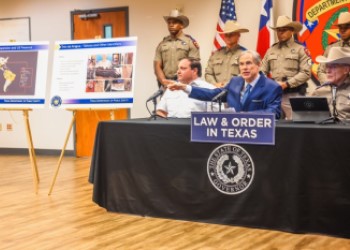Tren de Aragua’s supposed expansion into the United States has received national media coverage and attention from the country’s most prominent politicians, fueling questions about the extent of the group’s presence and activities.
The criminal group took advantage of the large-scale migration of Venezuelans across South America to evolve from a prison gang into a transnational criminal empire, establishing its presence abroad from around 2018 onwards, especially in Colombia, Peru, and Chile.
Ahead of the US presidential election in November, the issues of migration and crime have pushed Tren de Aragua to the forefront of political discussion, making it expedient for both Democrats and Republicans to take a tough stance against the organization.
The US Treasury sanctioned Venezuela’s most significant criminal export as a transnational criminal organization in July, and Texas governor Greg Abbott recently designated it a terrorist organization.
US authorities have identified suspected members of Tren de Aragua across the country in recent months and made a number of arrests.
But the gang’s reputation appears to have grown more quickly than its actual presence in the United States.
InSight Crime has been tracking the group for years. Here’s what we know.
Who Are They?
The lack of any major identifying characteristics among Tren de Aragua members makes it difficult to know when a criminal is truly part of the organization.
Certain US law enforcement authorities have put out warnings about Tren de Aragua-related tattoos, such as rifles or Michael Jordan logos, and have even arrested suspects based on their tattoos. While a Chilean regional prosecutor found that multiple members of one Tren de Aragua-linked cell there bore the same tattoo, members do not consistently identify themselves using specific tattoos or adopt tattoos as part of an initiation process.
The lack of information sharing between US and Venezuelan authorities means law enforcement officials cannot easily discover if an individual is a former prisoner or suspected Tren de Aragua member, nor will such information be flagged for any individuals crossing the border into the country.
“As a federal agent, we have no way of vetting these people other than the honor system,” US Border Patrol Council Vice President Chris Cabrera told reporters at a press conference in September. “If they tell us their name, we can’t check against Venezuela’s database.”
Additionally, the infamy Tren de Aragua has developed has led to imposters adopting its name as a method of instilling fear and ensuring compliance from their victims, further complicating efforts to establish whether a suspect is a genuine member or not.
Where Are They?
Although authorities’ methods of identifying Tren de Aragua members or their links to the wider organization remain unclear, reports of alleged Tren de Aragua activity have arisen in at least ten US states. Cases in Colorado, Texas, and New York have received prominent attention, alongside others in Illinois, Florida, Louisiana, Indiana, Georgia, Virginia, and New Jersey.
Police in Aurora, Colorado, have identified several individuals officials referred to as “documented Tren de Aragua members,” but have not explained the specific documentation linking them to the gang.
Texas governor Abbott stated that many of the more than 20 individuals arrested at a hotel in El Paso in early September were suspected Tren de Aragua members, and that officials arrested more than 100 suspected members during a disturbance at the El Paso border in March.
He did not clarify how officials identified the suspected members. Officials in both Texas and Colorado have also created dedicated task forces aimed at tackling the gang.
What Do They Do?
Some of the crimes committed by alleged members in the United States align with Tren de Aragua’s most common crimes. The group is known for human trafficking and human smuggling, in particular, which it adopted during its expansion across South America.
SEE ALSO: Is Venezuela’s Tren de Aragua Behind Surge in Chile Kidnappings?
Other cases in the US involve petty crimes like burglary or robbery, which are not as closely associated with the organization’s international cells. And there have been few reported cases of extortion, a central pillar of the group’s criminal portfolio.
Additionally, there is no evidence, thus far, of cells in the United States cooperating with one another or with other criminal groups. Authorities have also not revealed any proof of criminals receiving specific instructions from the organization’s leadership or sending money to Venezuela or other foreign countries.

